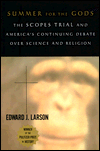 The end of summer break draws near and I have finished my summer reading with Edward J. Larson's 1997 book, Summer for the Gods. In this text, Larson gave an in-depth analysis of the famed Scopes Monkey Trial, the events leading to the trial, the trial itself, its immediate aftermath, legacies and historiography. This particular case truly was the "case of the (20th) century" and marked a key moment in America's ongoing debate on science, religion and education. Furthermore, it was a key event in the early-1900s emergence of modernism and reactions to modernism, an ideology that the Catholic Church responded to under the leadership of Popes Pius X, Benedict XV and Pius XI (*). It is also an event that is often misunderstood today, especially with erroneous "histories" written decades later and the popularity of the fictitious and certainly not historically-accurate play turned film, Inherit the Wind.
The end of summer break draws near and I have finished my summer reading with Edward J. Larson's 1997 book, Summer for the Gods. In this text, Larson gave an in-depth analysis of the famed Scopes Monkey Trial, the events leading to the trial, the trial itself, its immediate aftermath, legacies and historiography. This particular case truly was the "case of the (20th) century" and marked a key moment in America's ongoing debate on science, religion and education. Furthermore, it was a key event in the early-1900s emergence of modernism and reactions to modernism, an ideology that the Catholic Church responded to under the leadership of Popes Pius X, Benedict XV and Pius XI (*). It is also an event that is often misunderstood today, especially with erroneous "histories" written decades later and the popularity of the fictitious and certainly not historically-accurate play turned film, Inherit the Wind. *Note: I try to include some Catholic history whenever possible.
As I turn my attention to a new school year and another journey through American History, I look forward to my eighth run of reading, analyzing and discussing the history of our people and our nation with bright, young minds. This year in particular will bring some important developments in the field of United States History:
1. The continuation of the 150th Commemoration of the Civil War which I have already written about here
2. The 10-year anniversary of the attacks of September 11th.
The Organization of American Historians has dedicated this quarter's issue of the Magazine of History to 9/11. In reading the first few articles, it is evident that at least the opening historians have a very negative view of the consequences of September 11th and the responses of President George W. Bush. While I will avoid discussing or challenging those opinions here, it does bring to light this point (or opinion): It is simply too soon to give true historical analysis without the temptation to include one's political beliefs. I hope that this tenth anniversary will be a time to properly remember those who lost their lives that day, to remember those who gave the ultimate sacrifice in the line of duty and to remember those soldiers who gave their lives in the years that followed. Certainly, the legacies of September 11th are still with us and I hope that a genuine commemoration will take place.
I look forward to a new school year of conversation on these and other issues in our nation's past, present and future.
As always, I conclude with a few links:

